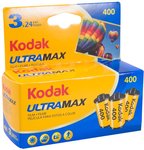Looks like this deal is back again & no back orders. Enjoy :)
- This offer is for 3 24 exposure rolls of Kodak Color Print Film ISO 400.
- Great pictures in sunlight or low light, in action or still; The world"s most versatile 400-speed film choice.
- Great pictures in a wide range of lighting conditions; Better pictures in low light; Sharper pictures with moving subjects; Extended flash range for better flash pictures; * Reduced effect of "camera shake"; Better depth of focus capabilities.
- Bright, vibrant prints; Consistent color under most lighting conditions.
Extra 5% off for Amazon Prime members — $11.66 Delivered



 CamelCamelCamel
CamelCamelCamel
How do we turn these in to photos to be viewed on phone?